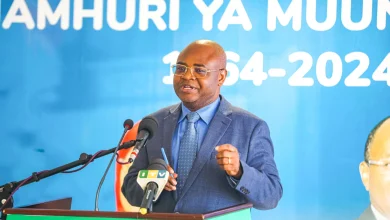Revisiting the forgotten roots of Union

ZANZIBAR: AS Tanzanians celebrate 61 years of the Union between Zanzibar and Tanganyika, many remain unaware that the birth of the United Republic on April 26, 1964, was the culmination of efforts led by the late Sheikh Abeid Amani Karume.
These efforts began in the late 1950s when he participated in a conference of African liberation leaders held in Ghana.
Following that pivotal meeting in Ghana, Karume emerged as one of the vocal proponents for African unity, including the unification of East African nations—Uganda, Kenya and what was then Tanganyika.
“When Karume returned from Ghana, he was welcomed with cheers at the airport by citizens wearing straw hats. He believed deeply in unity and worked tirelessly to bring together political parties so they could speak with one voice against colonial powers,” recalls 85-year-old Baraka Shamte, a witness to many political developments before and after the Union.
Baraka Shamte is the son of Mohamed Shamte, who served as the first Prime Minister of Zanzibar following the ‘pseudo-independence’ granted by the British in 1963 while the Sultan, Jamshid, remained in power.
He explains that during the late 1950s, it was nearly impossible to unite political parties in Zanzibar or to form regional alliances due to colonial strategies that succeeded in dividing liberation leaders.
“But Karume never gave up or lost hope,” says Shamte. “He continued his underground campaign to unite political leaders, and eventually succeeded in forming the Afro-Shirazi Party (ASP), which later led the 1964 Revolution.”
According to Shamte, long before the Revolution and the subsequent Union, Karume had already begun rallying support among the people of Zanzibar for a merger with Tanganyika.
“Many meetings were held in both Unguja and Pemba, involving elders’ councils, ASP gatherings, and joint sessions with TANU, to build consensus for the Union,” he says.
“It was Karume who first suggested to President Julius Kambarage Nyerere that they form a Union, with Karume serving as Vice President.”
“There’s a misconception that citizens were never consulted about the Union. That’s not true,” Shamte insists.
“The Union wasn’t a rushed affair. One of Karume’s public meetings was held at Rahaleo, where he directly asked the people whether they supported the idea—afterwhich they affirmatively responded.” S
hamte reveals that after the January 1964 Revolution and before the official merger of the two countries’ military forces, Zanzibar faced four attempted coups.
This situation led Karume and Nyerere to agree on unifying their defence forces to ensure national security and public safety.
He adds that Karume and Nyerere laid a firm, unbiased foundation for the Union, emphasising community volunteerism and leaders who prioritised the needs of ordinary citizens.
Shamte believes Tanzania’s Union remains the strongest and most enduring in Africa because its founders were sincerely committed to unity—unlike other nations, where colonial legacies of division continue to sow discord.
ALSO READ: PM credits Union for strong, resilient nation
“The colonial ‘divide and rule’ tactic still haunts many African nations. That’s why some people in Tanzania are dissatisfied with the Union and want it dissolved. We must remain vigilant—this Union has many benefits,” he warns.
He points out that the challenges the Union faces are resolvable and can be addressed through dialogue. Most issues arise not from the Union itself, but from some officials failing to fulfill their duties.
“For example, the frequent complaints from Zanzibari traders being restricted from selling goods on the mainland are more about poor implementation than constitutional flaws. Some Mainland officials lack understanding or the spirit of the Union,” Shamte explains.
“Likewise, some Zanzibari ministers and civil servants also misunderstand or ignore Union laws, failing to present their cases effectively in joint government meetings.”
He stresses that many of the Union’s problems stem from leaders abandoning the vision of the founders, particularly the Arusha Declaration, which clearly outlined the principles of just leadership.
Despite the issues, Shamte urges Tanzanians to continue honouring and preserving the Union, emphasising that it offers numerous benefits.
His sentiments are echoed by former government minister Mohamed Aboud Mohamed, who served in both the Zanzibar and Union governments.
According to Mohamed Aboud, Tanzanians have been enjoying the fruits of the Union since even before its official formation in 1964.
“One of the major benefits is the freedom to live and settle anywhere within the United Republic of Tanzania. That’s a huge advantage,” he says.
Another key benefit is the assurance of peace and security.
“People appreciate the Union. It offers many opportunities, especially in business and agriculture. Many Zanzibaris live and work on the mainland, and likewise, many Tanganyikans live in Zanzibar. They’re taking full advantage of that,” says retired Minister Mohamed Aboud.






354759 757744A person essentially lend a hand to make significantly articles I might state. That will be the extremely very first time I frequented your website page and up to now? I amazed with the research you produced to create this particular publish incredible. Fantastic activity! 34443